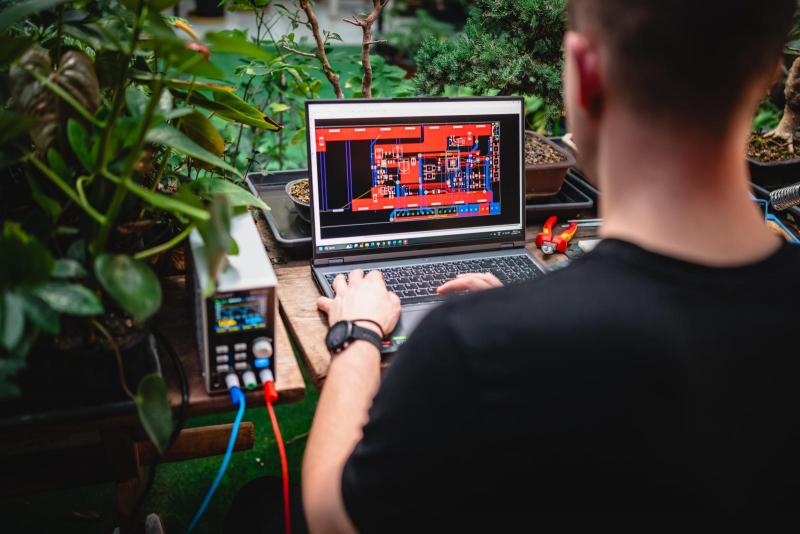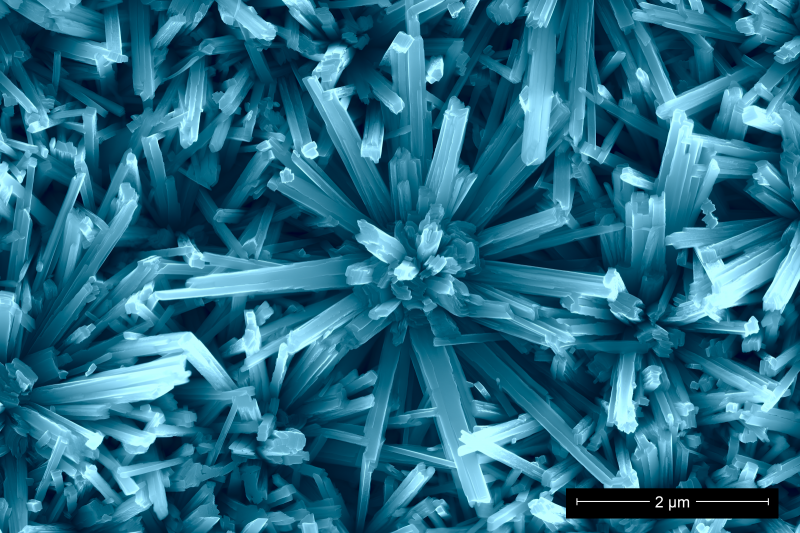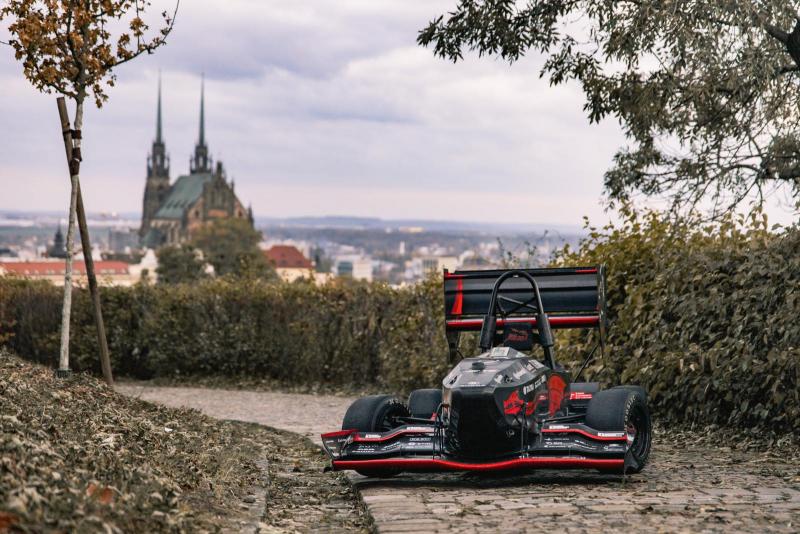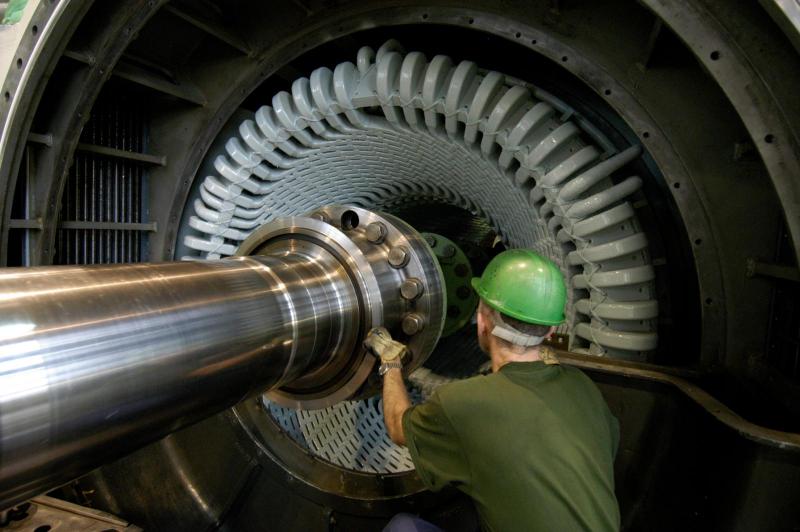BUT exhibition offers a glimpse into future technologies
Brno University of Technology is celebrating 125 years this year. From humble beginnings in rented classrooms, it has grown into an internationally renowned educational and research institution that achieves excellent results. To celebrate its birthday, Brno University of Technology has also prepared a panel exhibition that introduces the public to the strategic areas of the university, its scientific achievements and future technologies.BUT excels not only in traditional technical fields but also in cutting-edge areas such as semiconductor technology and microchips, microscopy, space and aerospace technologies, electromobility, nuclear energy, nanomaterials, artificial intelligence, cybersecurity, environmental engineering, and more. With strong representation in the arts, architecture, and design, the university creates a unique bridge between the technical and artistic worlds, fostering creativity in both research and education.
Curious about the modern technologies being developed at Brno University of Technology?
We develop technologies to mitigate climate change.
Brno University of Technology is committed to sustainability and environmental stewardship. Our experts focus on developing renewable energy technologies, including photovoltaic cells, panels, and optimization systems. A key area of research is perovskites, which enhance solar cell efficiency and are easier to produce than traditional silicon. "Tandem solar cells, which combine perovskite with silicon, have immense potential," explained Pavel Klok, a researcher at FME. "Silicon cells can only convert specific wavelengths of light into electricity, leaving the rest unused. By effectively pairing silicon with perovskites, we estimate that it’s possible to nearly double the current efficiency of solar cells."
Batteries and construction are also related to sustainability. According to university experts, the future of batteries lies in the lithium-sulphur combination, which offers significantly higher capacity compared to conventional lithium-ion batteries. This innovation promises greater energy storage, reduced weight, and more environmentally friendly solutions.
In the construction industry, BUT is actively researching and developing advanced building materials, focusing on alternatives to energy-intensive cement production. These new formulas aim to make the cement manufacturing process both more cost-effective and environmentally friendly, while still maintaining properties comparable to traditional cement.
In the construction industry, BUT is engaged in research and development of advanced building materials and finding a new way to replace energy-intensive cement production.

We recycle for sustainable materials
Discarding materials is costly, so the university views waste as a challenge and is committed to recycling and repurposing. "Civilizations eventually exhaust resources and must improve their use," explained Stanislav Obruča, a waste recovery specialist at FCH. "The era of treating raw materials as expendable is ending." A prime example is Plastic Guys, a company founded by BUT graduates that makes furniture from recycled plastic.
What can we recycle beyond plastics? For instance, solar panels contain metals that can be repurposed into new alloys with aluminum. A discarded solar panel could be transformed into a new engine block or gearbox.
We can also recycle water, but conventional wastewater treatment plants struggle with certain types, such as wastewater from wineries, especially during harvest when pollution levels are high. Scientists from Brno University of Technology have developed a technology that not only cleans winery wastewater but also repurposes it effectively.

We are one of the leaders in semiconductor technology
If Brno is the Silicon Valley of Europe, then BUT is its centre. Brno University of Technology is an integral part of the semiconductor value chain and is coordinating the preparation of the the National Competence Centre for Semiconductors and Chips project, whose aim is to support the objectives of "Chips for Europe" and join the emerging network of European competence centres.
"The recent global crisis has brought Europe to a critical juncture. Europe has recognized the need to bolster technological self-sufficiency and independence in essential resources and technologies. Semiconductors and chips are strategic and indispensable in today’s world,” said BUT rector Ladislav Janíček.
The demand for chips is continually increasing, making quality education in this field crucial. To address this, the university has introduced a new study program in Chip Design and Modern Semiconductor Technology at FEEC. Students will begin learning chip design during their bachelor's studies and further enhance their skills in the subsequent master's program. Additionally, students will gain hands-on experience in chip manufacturing at the CEITEC BUT research centre.

We unveil the secrets of the microworld
Did you know that one in every three electron microscopes comes from Brno? The South Moravian metropolis is one of the global hubs for electron microscopy, with BUT playing a key role. The university is a vital part of the Brno innovation ecosystem (#brnoregion) and has long collaborated with local institutions and companies to advance electron microscopes, new methods, and applications. One important partner is Thermo Fisher Scientific, a world leader in products and services for science. Its Brno technology centre produces cutting-edge electron microscopes and spectrometers, which it supplies worldwide.
New technologies allow us to explore particles and structures beyond the reach of the human eye. Electron microscopy has revolutionized scientific research, providing invaluable insights across biological, material, and environmental sciences.
"Microscopes serve diverse functions, including studying structure, size, topography, and morphology, analyzing defects and fracture surfaces, and assessing the quality of micro and nanostructures," explained Petr Lepcio from CEITEC BUT, where electron microscopes are integral to nearly all research and investigations.

We drive innovation in automotive and electromobility
Innovative technology, emission-free vehicles, and promising prospects define the future of the automotive industry, with Brno University of Technology playing a key role. “Alongside being a global leader in electron microscopy, the Czech Republic is also a significant force in the automotive sector,” said but rector Ladislav Janíček.
Electromobility is a global megatrend that requires adaptation. To meet this need, BUT trains top engineers who design and build technology according to the latest standards. For example, the new Automotive Electronics and Electromobility program at FEKT offers in-depth knowledge of vehicle electronics. This initiative addresses the long-standing shortage of specialists in automotive electronics, responding to industry demands.
Students at the university also engage with the automotive industry and electromobility directly. The TU Brno Racing team designs and builds formula racing monoposts, which they use to compete in Formula Student events worldwide, consistently achieving top positions.

We create a Czech footprint in space
Space and aerospace technology is a strategic focus at BUT. The university's experts, equipped with prestigious education, leverage their knowledge to advance new technologies and push boundaries. They develop space technologies, design small satellites, and analyze space data.
The university is also training the next generation of space engineers through the Space Applications degree program at FEEC, the first in the country dedicated exclusively to the space industry. "With the rapid increase in small satellites, there are numerous opportunities for companies to contribute to Earth imaging or provide communication for smart devices," explained program sponsor Tomáš Götthans. "As the number of companies grows, so does the demand for systems engineers with expertise in the space industry."
Thanks to the new study program, the university's YSpace team has been established at BUT. They are developing the first Czech student satellite to study cells in space, with plans to launch it into orbit in 2026.

We educate nuclear engineers
The nuclear industry plays a crucial role in energy security and independence. However, there is a current shortage of high-quality specialists in the region.
To address this, BUT has launched a new Nuclear Engineering degree program that provides multidisciplinary knowledge and practical internships. This program is further supported by instruction in the newly built ionizing radiation laboratory. “This field of study and research is closely connected to our long-standing collaboration with the Dukovany Nuclear Power Plant, where many BUT graduates have found employment,” said Ladislav Janíček, rector of BUT. “Nuclear energy is a key component of the Czech Republic’s clean energy mix and is vital for the nation’s energy security and economic competitiveness.”

We develop nanotechnologies for medicine
Nanotechnology and nanomaterials are crucial to modern medicine, and Brno University of Technology is a leading institution in this field. BUT scientists focus on developing joint replacements, medical nanorobots, and gene therapy technologies like CRISPR. “CRISPR is a revolutionary technology that enables precise genetic modifications,” explained Alžběta Ressnerová from CEITEC BUT. “It uses an enzyme to cut DNA with molecular precision and a guide to direct these cuts to specific genomic locations, allowing us to remove problematic genes or restore dysfunctional ones.”
In addition to healthcare applications, university experts are working on nanorobots for detecting microplastics in water, conducting space missions, and even accelerating beer production. “By integrating research in areas like 3D printing, nanorobots, space exploration, microplastics, biomedicine, and energy, we are pushing the boundaries of knowledge and benefiting greatly from interdisciplinary collaboration,” said Martin Pumera, a leading scientist at CEITEC BUT."

We create a safer future in cyberspace
Information technology is advancing rapidly, and cyberspace demands increased vigilance. Brno University of Technology is at the forefront of developing technologies to enhance cybersecurity.
Researchers at BUT are working on detecting voice deepfakes to prevent the spread of false information and protect sensitive data. "People often overlook errors or poor quality in deepfake voices, making everyone using phones or social networks vulnerable," explained Anton Firc from FIT.
The same faculty hosts a team of speech scientists who analyze speech to extract various types of data. Their methods assist security forces in understanding foreign and less common languages and recognizing artificial intelligence.
Additionally, university experts have developed a comprehensive cybersecurity training platform, BUTCA. This technical arena is designed for hands-on training in cyber threats, with a focus on real industrial applications, interactive gameplay, and user engagement."

We connect art with technology
The unique collaboration between the art and technical faculties highlights the role of technology in the arts. Artists at Brno University of Technology employ various technical tools, such as 3D scanners and computer technology, to enhance and streamline their work. Modern technology enables them to create sculptures, computer games, and user-friendly administrative systems. “Our collaboration started with the need for a new database system. We focused on features that would help clients navigate complex situations and simplify record-keeping for social service workers,” explains Martina Růžičková from FFA, who contributed to designing a new system for social services.
Architects at BUT use technology to design sustainable spaces, envisioning the future of our cities and even the design of polar stations in Antarctica, where material durability is crucial. “We analyzed meteorological data from the nearest station and ran simulations to determine the optimal structure. We created an aerodynamic shape to minimize air resistance and prevent snow accumulation on leeward sides,” explains Martin Kaftan from FA, discussing the challenges of building in extreme conditions.

The university will celebrate its significant anniversary throughout the year. The year’s festivities will culminate with the BUT Ball on 6 December, a grand event for students, staff, alumni, and friends, and the largest ball in the Czech Republic. For more details about the 125th anniversary celebrations and upcoming events, visit vut.cz/en/125.
The panel exhibition is part of the celebration of the 125th anniversary of BUT.
| Author | Bc. Lenka Hubáčková |
|---|---|
| Published | |
| Link | https://www.vut.cz/en//f19528/d264150 |